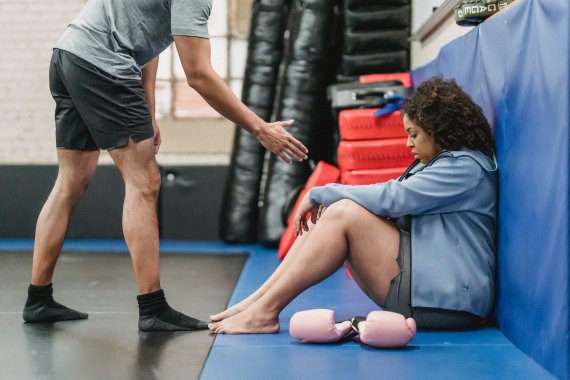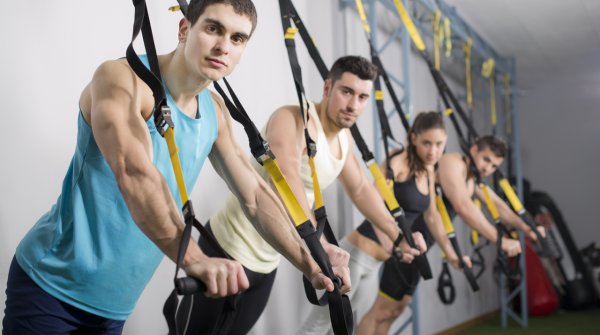
While the trip to the orthopedist is easy, the one to the psychologist difficult. "To a certain extent, it is alarming that psychological care and preparation of athletes who participate in the 'most beautiful secondary matter in the world' has become necessary," writes skier Franz Vogler in the 1973 book "Psychological Competition Training." More than 30 years later, ski jumper Sven Hannawald made his burnout diagnosis public - he didn't get much understanding for his situation back then. Although more and more athletes, most recently Simone Biles, Naomi Osaka or Nyjah Huston had the courage to talk about their mental problems in the past years, the reactions are still quite mixed. Another sports person who recently went public is German football manager Felix Magath who expressed in an interview that he was on the verge of a burnout.
The World Health Organization (WHO) defines mental health as follows: Mental health (physical or mental health and social well-being) is a state of well-being in which a person can realize his or her capabilities, cope with the normal stresses of life, work productively, and contribute to his or her community.
"I'm happy for everyone who doesn't know what burnout is," says Sven Hannawald about the reactions to his announcement. Even though, according to him, there are still enough athletes who would get over their condition with an announced time off. Or whose agencies want to keep up appearances so that their careers don't get scratched. "But I am also happy for all those who make it public," and thus have a chance to regulate their daily lives. For him, it was too late to return to competitive sports - "it was over".

Today, the burnout syndrome has largely arrived in society and is also accepted. Dr. Tatjana Reichhart, a specialist in psychiatry and psychotherapy, attributes this to the fact that the state of being burnt out is "totally recognized" in our performance-oriented society. In contrast, the diagnosis of depression is still stigmatized. Often this diagnosis is simply shrugged off as a person's inablitiy to cope with the pressure. This applies to the sports world as well as the working world.
It is important to disinguish in which stage the affected person is. Someone who's burned out would come up with several ideas in answer to the question what they would like to do if they would get back all energy. With depression, the joylessness would be in the foreground and therefore no answer would come.
How difficult it is for athletes to take care of their mental health is also shown by the example of climber Alexander Huber of the Huberbuam. Today he has overcome his disease, and in 2013 he published the book "The fear, your best friend" on the subject of fear as well as his anxiety disorder.

It is felt that the numbers of top athletes and sports managers who end their careers due to psychological problems are increasing. However, a study on the frequency of mental illnesses in professional sports states that for the two most common illnesses - anxiety disorders and depression - top athletes have a risk of illness that is largely comparable to that of the rest of the population. This was the conclusion reached by a team of Australian researchers in 2016, who evaluated around 60 studies. Since burnout is not an independent disease, absolute numbers are missing. In 2014 however, the Ärztezeitung wrote that every 10th top athlete is affected by burnout.
For former national coach Olaf Kortmann, the linchpin is the question: "Do I allow myself to accept sports psychological support?" Because mental training is about "calling up the best possible performance and not necessarily winning." Kortmann knows what he's talking about. As a club and national coach in volleyball and later beach volleyball, his teams have won numerous national and international titles. A special focus of his work is the mental coaching of professional teams and top athletes. According to him it is important to mentally work action-oriented, rather than goal-oriented or result-oriented. So, for example, not to set the winning of a medal as a goal, but to focus on the technique in the moment. "Everyone can determine for themselves what success is. This reduces the competition stress enormously," says Kortmann.

"Admitting to yourself that it may not be possible to go on like this" - that is a first step for Sven Hannawald. It is also important to develop an awareness of one's own body, to perceive stress, to allow oneself breaks and to pay attention to balance. "Listening to your own voice." All this can prevent an overload.
However, the existential fears that spur some to even more physical training should not be underestimated. So does the influence of social media. "In the past, we sat on the bus on the way to the next competition and looked out the window or closed our eyes for a while." Today, many would be on their cell phones, thinking about the next social media post. "That's constant alarm for the noggin" and is not a mental break.
What the former top athlete really appreciates: Today coaches are way better (trained) in recognizing how athletes are actually doing.
And examples like Max Eberl, Naomi Osaka and Simone Biles "make everyone more aware of the fact that it can hit anyone." Knowing what he know today, he also admits that he had to learn to take breaks. Now he marks timeouts with a "thick, red X in the calendar," which he may have to push back and forth, but no longer overwrites.
Mental training works on different levels, and is, according to Olaf Kortmann, "like a colorful bouquet of flowers." However, it must be tuned very individually. That is why it is always difficult to support complete teams mentally. Or as Sven Hannawald puts it: "Everyone has their own baggage to carry."
Relaxation techniques such as autogenic training or progressive relaxation help to calm the mind during rest phases, but also to be able to concentrate better in performance situations. Yoga provides inner and outer balance through both breathing techniques and flowing movements. Patrick Broome, yoga instructor of the national soccer team, said in a interview: "Yoga helps to feel yourself, develop body awareness and sleep better. Recovery is the factor you know you can still get the most out of. Who recovers quickly, can quickly bring back peak performance."

In addition to relaxation techniques, there are various mental training techniques such as ideomotor training (for example, to imagine the ride through the ice channel) or prognosis training (among other things, strengthening awareness and realistic self-assessment). They strengthen both the cognitive and the emotional abilities of the athletes. But without sports psychology support, training is difficult, says Kortmann. What everyone can do well, however, is to practice adaptability in the face of problems (resilience), explains Dr. Reichhart, author of the book "Das Prinzip Selbstfürsorge" (The Self-Care Principle). This includes, for example, to consider how you can practice mindfulness in everyday life.
How important breath is for performance, emphasizes yoga instructor Sarah Mahr as well, and refers to the recently published book "Breath - The New Science of a Lost Art" by James Nestor.

Dr. Reichhart is sure: Top athletes do have it easier to resort to psychological care. "For professionals, sport is the job they do. In contrast, recreational athletes still pursue a profession in addition to their hobby. The time they can spend on their mental health is more minimized." Another big advantage is "that the sense of purpose and meaning for athletes is absolutely given." Whereas employees in a company would certainly have to do things more often that do not necessarily make sense to them.
Sven Hannawald adds another advantage of athletes: "Most of them move a lot." In contrast to many employees - occupation is often equivalent to little to no movement. Nevertheless, even recreational athletes should have an eye on how often they train, add slower, easier units, and - above all - schedule training breaks.
As with almost everything, however, the name of the game here is: Find the balance! Overtraining and too much pressure to perform can take their toll on mental health, but in the right doses, regular exercise can also be a miracle cure for mental health. 15.09 minutes a day is already enough to strengthen mental well-being, according to a study developed by the Golin agency.
In this study, Asics used its "Mind Uplifter" technology to measure the effects of exercise on the brain and got thousands of athletes, including Olympic sprinter Iwan Thomas, to abstain from exercise for 7 days.
How did the subjects fare afterwards? Decreased self-confidence, mental energy and stress resistance. In short: they felt significantly worse.
- ISPO awards
- Mountain sports
- Bike
- Design
- Retail
- Fitness
- Health
- ISPO Job Market
- ISPO Munich
- ISPO Shanghai
- Running
- Brands
- Sustainability
- Olympia
- OutDoor
- Promotion
- Sports Business
- ISPO Textrends
- Triathlon
- Water sports
- Winter sports
- eSports
- SportsTech
- OutDoor by ISPO
- Heroes
- Transformation
- Sport Fashion
- Urban Culture
- Challenges of a CEO
- Trade fairs
- Sports
- Find the Balance
- Product reviews
- Newsletter Exclusive Area
- Magazine






